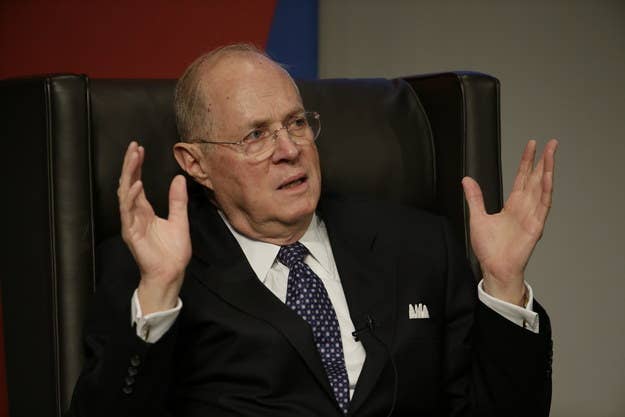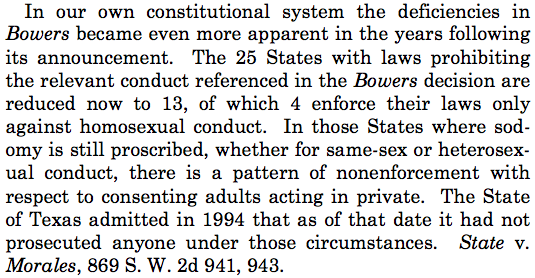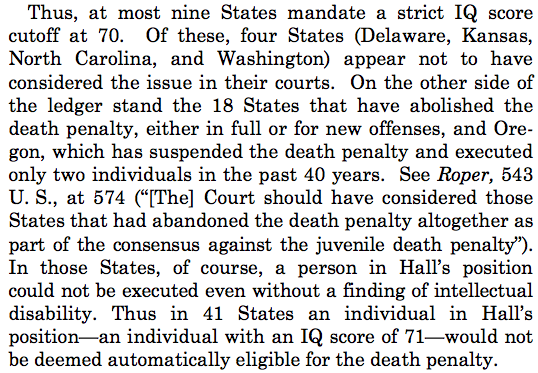
WASHINGTON — Supreme Court Justice Anthony Kennedy often focuses on two ideas when he plays a part in moving the law: human dignity and the cumulative importance of the states.
On Monday, the court decided not to take up seven cases involving bans on same-sex couples' marriages. The decision advanced Kennedy's two main interests in a significant way — and set the course for achieving marriage equality in 50 states.
Advancing Kennedy's Vision of Human Dignity:
The court increased human dignity, as understood and detailed by Kennedy in a trio of gay rights cases that began in 1996. As Kennedy most famously put it in the middle of those cases, the Constitution's founders knew that "times can blind us to certain truths and later generations can see that laws once thought necessary and proper in fact serve only to oppress." Those three cases struck down an anti-gay amendment in Colorado in Romer v. Evans, struck down sodomy laws in Lawrence v. Texas in 2003, and culminated — at least, for now — in the 2013 decision striking down part of the Defense of Marriage Act in United States v. Windsor.
In that Windsor decision, Kennedy described how New York had expanded marriage to same-sex couples. "This status is a far-reaching legal acknowledgment of the intimate relationship between two people, a relationship deemed by the State worthy of dignity in the community equal with all other marriages" he wrote. "It reflects both the community's considered perspective on the historical roots of the institution of marriage and its evolving understanding of the meaning of equality."
But DOMA, Kennedy wrote, was invalid — because it did not protect the dignity of the individual and some individuals' marriages. "The federal statute is invalid, for no legitimate purpose overcomes the purpose and effect to disparage and to injure those whom the State, by its marriage laws, sought to protect in personhood and dignity." He wrote that the law violated the Fifth Amendment because it treated "those persons as living in marriages less respected than others."
Now, same-sex couples in five additional states — Indiana, Oklahoma, Utah, Virginia, and Wisconsin — are living under legal marriage equality. And, same-sex couples in six more states — Colorado, Kansas, North Carolina, South Carolina, West Virginia, and Wyoming — are expected to have the right to marry in short order.
For Kennedy, "personhood and dignity" were winners on Monday.
Advancing Kennedy's Power of the States
The court's decision not to decide has the effect, then, of adding 11 more states to the marriage equality column — an issue that could be key to a decision of the court on whether marriage equality should be the law of the land in all 50 states.
Look at how Kennedy addressed the issue back in 2003, when he wrote the court's opinion striking down sodomy laws, reversing a decision from 1986 in Bowers v. Hardwick that upheld the constitutionality of such laws:

Just this past term, Kennedy addressed a similar issue, when writing for the court in Hall v. Florida that the state's 70-point IQ test threshold for showing an intellectual disability to forbid execution was unconstitutional. Again, in invoking "the Constitution's protection of human dignity," Kennedy looked to a list of states for helping to determine the issue:

Now, once the fallout from Monday's decision is complete, there are expected to be 30 states with marriage equality. When the 9th Circuit Court of Appeals rules in its pending marriage cases — and it is strongly expected to strike down Idaho and Nevada's bans on same-sex couples' marriages — there will, once the fallout is done, be 35 states with marriage equality. If the 6th Circuit reaches the same decision as the other four circuits to have heard the issue in its pending cases, that would add another four states to the mix, bringing the list to 39 states.
Which Leads to the End Game:
If an appellate court does decide to uphold a marriage ban — whether it comes from the 6th Circuit or a later decision — Justice Anthony Kennedy, as the presumed key vote on the issue, would now have a solid list of 35 to 39 states to put behind an opinion reflecting "the evolving understanding of the meaning of equality."
What's more, given that only four votes are needed to grant certiorari in a Supreme Court case and given that none of the seven petitions before the court this past week could garner those four votes, it's entirely possible that the justices — on both sides of Kennedy's view — know that Kennedy controls the board at this point.
The more conservative justices may believe — likely correctly — that granting certiorari in one of the cases on Monday probably would have resulted in a Kennedy opinion striking down all the remaining bans across the country. With that concern in their mind, it's possible that they didn't want to risk it. It's possible that some of the justices — notably, Chief Justice John Roberts — could wish, if such is a decision is inevitable, that it come with more states already on the side of marriage equality before being handed down.
And the more liberal justices may believe — likely correctly — that even if they could win now, Kennedy would be more comfortable with such a decision if they could have a case come to them with more states on the marriage equality side of the ledger. It's possible other justices — including Ruth Bader Ginsburg and Stephen Breyer — would be in agreement with him on that point.
In other words, when the Supreme Court decided not to decide Monday, the court effectively sketched out the end game for the marriage equality movement.
